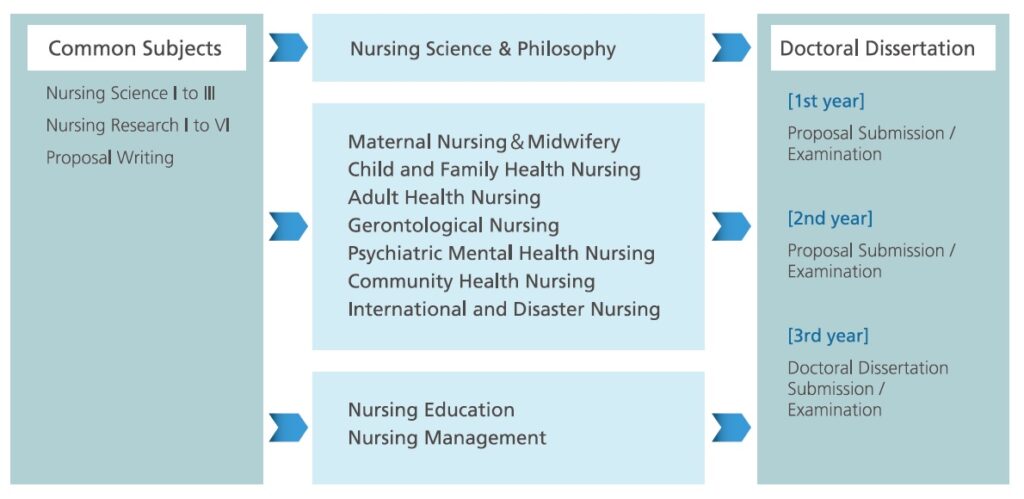Doctoral Program in Nursing
Educational Objectives
Our aim is that students acquire the rich and wide-ranging learning that forms the basis for cultivating necessary high-level research skills to either carry out independent research as nursing researchers or work on other advanced specialized projects
Diploma Policy
To qualify for award of a doctorate (PhD, Nursing), in addition to acquiring the prescribed number of course credits after attending the doctorate program for the prescribed period, and passing the thesis examination, the candidate must also be judged to meet the requirements listed below.
1. Based on profound knowledge and advanced practical skills, is capable of independently carrying
out research activities that can play a role in improving the health and welfare of people and to contribute to the development and enhancement of nursing.
2. Possesses superior competence and ethical awareness, and has the qualities and abilities as a leader, administrator, educator, and researcher to provide international and interdisciplinary leadership.
Curriculum Policy
To achieve its human resource training goals, the doctoral program has been organized according to the policies below.
1. The field includes Nursing Science & Philosophy, Applied Nursing (Maternal Nursing & Midwifery,
Child and Family Health Nursing, Adult Health Nursing, Gerontological Nursing, Psychiatric Mental Health Nursing, Community Health Nursing, and International and Disaster Nursing), Nursing Education and Management.
2. For each field, there are compulsory advanced studies, special research, and common subjects.
3. Common subjects are provided for fostering high-level research capability: Nursing Science I, II and III
Nursing Research I, II, III, IV, V, VI, and Proposal Writing.
4. To enable writing guidance to be tailored to the individual needs of each student, special research
study in each field is provided for three years.
Admission Policy
1. A person able to apply knowledge gained from experience into logical thinking.
2. A person, while holding own opinions, having the flexibility of mind to listen to the opinions of
others.
3. A person able to pursue topics while becoming more deeply aware of potential problems.
4. A person having an interest in social affairs and the ability to see, and think about things with an
international viewpoint.
5. A person willing to seriously face ethical issues and work towards their resolution.
Overview
This program offers 3 fields and 10 areas of Nursing Science & Philosophy, Applied Nursing (including Maternal Nursing & Midwifery, Child and Family Health Nursing, Adult Health Nursing, Gerontological Nursing, Psychiatric Mental Health Nursing, Community Health Nursing, International and Disaster Nursing), Nursing Education and Nursing Management.
A doctoral degree (philosophy in nursing) can be obtained after having enrolled in the course for at least 3 years, acquired the predetermined credits in the subjects, received a necessary research guidance and then passed the final examination and the examination of dissertation.
This program develops a self-supporting capability of a nursing researcher whose knowledge and humanity are developed on the basis of the capabilities acquired in the master’s program.
A step-by-step curriculum is set up for this program wherein a research report is submitted in the first year and a research plan is drafted in the second year under the guidance of main and assistant research guides, thereby looking to obtaining the doctoral degree (philosophy in nursing) in 3 years.
Doctoral dissertations have been published as original articles in academic journals, many of which are highly evaluated academically.
*If excellent research performance is exhibited, the degree can be awarded in 2 years.
Features of Curriculum
For developing a high level of research ability, we offer subjects enabling students to acquire in-depth research knowledge that is required for the research of theoretical knowledge and research methodology that is required for creating a doctoral dissertation.
These subjects help them in developing the ability to demonstrate leadership from a broader interdisciplinary perspective that traverses across the disciplines.

